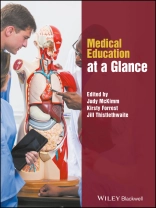Covering the core concepts, activities and approaches involved in medical education, Medical Education at a Glance provides a concise, accessible introduction to this rapidly expanding area of study and practice.
This brand new title from the best-selling at a Glance series covers the range of essential medical education topics which students, trainees, new lecturers and clinical teachers need to know. Written by an experienced author team, Medical Education at a Glance is structured under the major themes of the discipline including teaching skills, learning theory, and assessment, making it an easy-to-digest guide to the practical skills and theory of medical education, teaching and learning.
Medical Education at a Glance:
- Presents core information in a highly visual way, with key concepts and terminology explained.
- Is a useful companion to the Association for the Study of Medical Education’s (ASME) book Understanding Medical Education.
- Covers a wide range of topics and themes.
- Is a perfect guide for teaching and learning in both the classroom and clinical setting.
Зміст
Preface vii
Acknowledgements viii
About the Editors ix
Contributors x
Part 1 Overview and broad concepts 1
1 What is medical education? 2
2 Stages of medical education 4
3 Evidence-guided education 6
4 Learning theories: paradigms and orientations 8
5 Learning theories and clinical practice 10
6 The curriculum 12
7 Planning and design 14
8 Equality, diversity and inclusivity 16
9 Principles of selection 18
10 Evaluation 20
11 Educational leadership 22
12 International perspectives 24
Part 2 Medical education in practice 27
13 Large group teaching: planning and design 28
14 Large group teaching: delivery 30
15 Small group teaching: planning and design 32
16 Small group teaching: delivery 34
17 Clinical teaching: planning and design 36
18 Clinical teaching: delivery 38
19 Simulation: planning and design 40
20 Simulation: delivery 42
21 Patient involvement in education 44
22 Ward-based and bedside teaching 46
23 Learning and teaching in ambulatory settings 48
24 Teaching in the operating theatre 50
25 Interprofessional education 52
26 Reflective practice 54
27 Teaching clinical reasoning 56
28 Professionalism 58
29 Peer learning and teaching 60
30 Communication 62
31 Problem-based and case-based learning 64
32 Learner support 66
33 Supporting professional development activities 68
34 Mentoring and supervision 70
35 e-Learning 72
36 Social media 74
Part 3 Assessment and feedback 77
37 Feedback 78
38 Principles of assessment 80
39 Written assessments 82
40 Assessment of clinical skills 84
41 Work-based assessment 86
42 Assessing professionalism 88
43 Portfolios 90
44 Setting pass marks 92
45 Developing yourself as a medical educator 94
Further reading/resources 96
References 101
Index 107
Про автора
Judy Mc Kimm, Swansea University Medical School, Swansea University, UK.
Kirsty Forrest, Faculty of Health Sciences and Medicine, Bond University, Australia.
Jill Thistlethwaite, University Technology Sydney, NPS Medicine Wise Sydney, University of Queensland, Australia.












